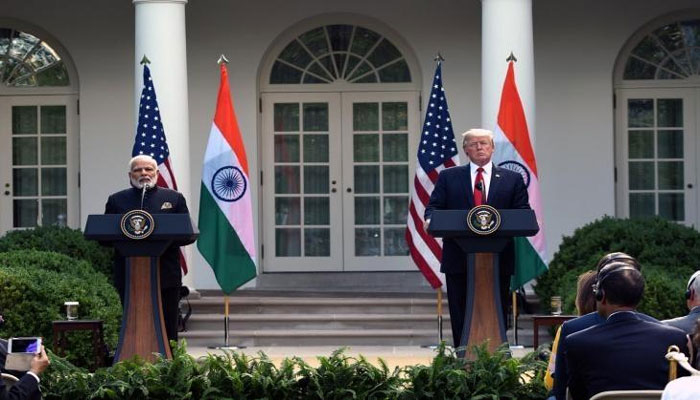TRENDING TAGS :
Donald Trump announces plans to end India's preferential trade treatment
It is to be mentioned that India is the largest beneficiary of the GSP exporting goods worth $5.6 billion to the US under the programme. Congress establishes the conditions of eligibility for GSP, which include “providing the US with equitable and reasonable market access, protecting workers’ rights and combating child labour.”
Washington: United States President Donald Trump, on Monday, announced that he intends to end India's preferential trade that allows $5.6 billion worth trade concessions which allows Indian exports to enter the United States duty free under the Generalised System of Preferences (GSP) programme. He also accused New Delhi of not providing Washington “equitable and reasonable access” to its markets.
Trump made the announcement in a letter to House Speaker, Nancy Pelosi and Vice President Mike Pence in his capacity as the Senate President, which read as:
"I am taking this step because, after intensive engagement between the United States and the Government of India, I have determined that India has not assured the United States that it will provide equitable and reasonable access to the markets of India."
The US Trade Representative’s Office (USTR) said that the trade preferences to India will end in 60 days after the notification to Congress and the Indian government. It also stated that the US goods and services trade deficit with India, in 2017 was $27.3 billion.
Trump, however, said that he will continue to monitor if India is “providing equitable and reasonable access to its markets” and meet the GSP eligibility criteria.
Meanwhile, India had opposed proposals to end the GSP saying that it would be “discriminatory, arbitrary” and hurt the country’s development.
The minister in charge of commerce at the Indian Embassy in Washington, Puneet Roy Kundal, at a hearing held by the USTR last June on withdrawing India’s GSP, had said that withdrawing the GSP benefits “would be discriminatory, arbitrary, and detrimental to the development, finance and trade needs of India, which is a vast and diverse developing country with unique challenges.”
It is to be mentioned that India is the largest beneficiary of the GSP exporting goods worth $5.6 billion to the US under the programme. Congress establishes the conditions of eligibility for GSP, which include “providing the US with equitable and reasonable market access, protecting workers’ rights and combating child labour.”
Trump wrote in his letter: “I am taking this step because, after intensive engagement between the United States and the government of India, I have determined that India has not assured the United States that it will provide equitable and reasonable access to the markets of India.”
The USTR had said in its statement: “India has implemented a wide array of trade barriers that create serious negative effects on United States commerce.”
“Despite intensive engagement, India has failed to take the necessary steps to meet the GSP criterion”, it added.
The primary aim of the GSP is to help developing countries, particularly in sectors where the benefits can reach the poor.
Trump, who has been determined to reduce US trade deficits, also said that he was ending the GSP for Turkey because of its economic success and rising living standards that would no longer make it eligible for the programme that is meant to help developing countries.
"In the four-and-a-half decades since Turkey's designation as a GSP beneficiary developing country, Turkey's economy has grown and diversified," he said.



